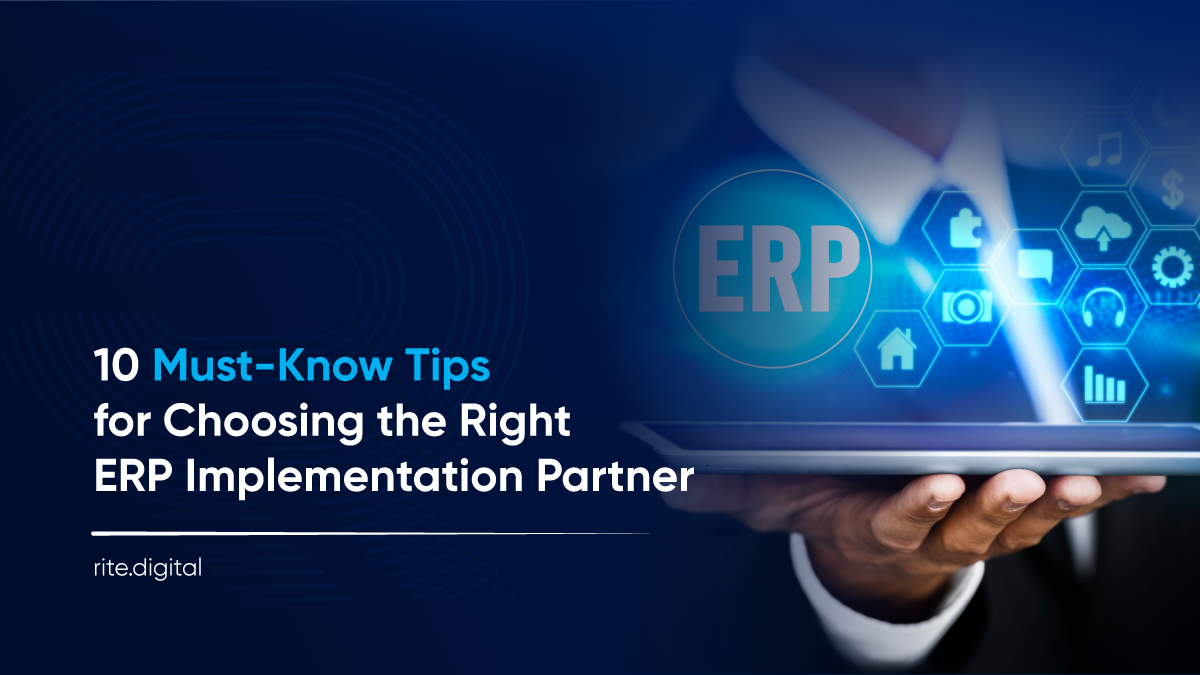10 Must-Know Tips for Choosing the Right ERP Implementation Partner

What is ERP Implementation?
ERP implementation is the process of setting up a centralized software system that connects your department’s finance, HR, procurement, supply chain, and other operations under one digital roof. But it is not just installing software. It is a complete shift in how your business works.
You’ll need to:
- Redesign business processes
- Move all your legacy data
- Configure Oracle Cloud to fit your operations
- Train your team to adapt to the new system easily
There are 5 critical stages in the ERP implementation process: discovery, design, testing, deployment, and support. Your ERP implementation turnaround time varies depending on the size of your organization and the scope of needs. Sound like a lot? It is, but with the right team and planning, it is absolutely doable.
Why Your ERP Partner Matters More Than You Think?
Here is something a lot of businesses learn the hard way:
Your ERP software won’t save the day on its own. Your Oracle ERP implementation partner plays a bigger role than you might think.
We’ve seen companies fall for big names or low-cost bids and later regret it. Why? Because ERP implementation success is about alignment:
- Alignment with your business goals
- Alignment with your team’s pace and readiness
- Alignment with your actual timeline, not a fantasy one
If your partner doesn’t understand your world or isn’t familiar with the right Oracle modules, things can unravel before you know it.
10 Factors that Help You Choose the Right ERP Implementation Partner
Here is your go-to list when evaluating a partner, along with the questions that’ll help you separate the experts from the rest.
1. Do They Have Solid Experience with Oracle Modules?
Oracle ERP isn’t just one tool, it’s a full suite. Your partner should know the exact modules you’re using.
Let’s say you’re using Financials and Supply Chain. You shouldn’t have to explain the basics, they should already speak that language.
Ask this:
“Have you led Oracle ERP implementation projects in both Financials and SCM? What were the results?”
2. Do They Understand Your Industry?
A pharma company and a construction firm don’t need the same ERP setup. Your partner should understand the compliance rules, workflows, and gotchas of your specific industry.
Ask this:
“Have you worked in our industry before? What challenges did you help solve?”
3. Do They Provide a Clear ERP Implementation Project Plan?
You shouldn’t have to guess what’s coming next. A proper ERP implementation project plan should be clear, phased, and well-structured.
If the plan feels too generic or “too good to be true”, consider it a warning sign.
Ask this:
“Can we walk through a sample project plan for a business like ours?”
4. Will the Timeline Work with Your Business Calendar?
A rushed ERP implementation timeline can derail the entire project. Your partner should understand your business rhythms – audit periods, financial closures, seasonal shifts and build a plan around that, not the other way around.
Ask this:
“How do you map your timeline to our operational cycles?”
5. Who's the ERP Implementation Project Manager?
Here is a truth we’ve learned again and again:
A great ERP implementation project manager can make a huge difference to your entire project.
You need someone proactive, communicative, and skilled at handling both tech and people dynamics.
Ask this:
“Can we meet the project manager who’ll be leading the charge?”
6. How do They Handle Change Management?
Change is tough. ERP is a big shift for your team, not just your tech stack. Your people might resist, hesitate, or feel overwhelmed. A good partner supports you with training, documentation, Q&A sessions, and all the human stuff tech guides can’t provide.
Ask this:
“What’s your plan for driving adoption, not just implementation?”
7. Do They Have a Smart Data Migration Plan?
Migrating data from legacy systems to Oracle Cloud isn’t something you want to “figure out as we go.” It needs care and a proven process. A skilled Oracle ERP implementation partner will clean, map, validate, and test your data to ensure a clean cutover.
Ask this:
“How do you make sure our data stays accurate during migration?”
8. Can They Handle Third-Party Integrations?
Your business will likely have other industry-specific tools, such as payroll systems and CRMs. The ERP implementation partner should know how to integrate Oracle ERP with these tools in a way that minimizes the need for switching between systems or entering the same data twice.
Ask this:
“Can you share examples where you integrated Oracle ERP with third-party systems?”
9. Do They Bring ERP Implementation Best Practices?
The best partners don’t start from scratch. They’ve got reusable assets, frameworks, and ERP implementation best practices that save time (and avoid surprises).
Ask this:
“What are the frameworks you implement, and do you have accelerators to guide your ERP implementation?”
10. Is Their Pricing Flexible and Transparent?
Once the ERP implementation process starts, plans often change. Sometimes, you may need to add a few extra functionalities or encounter unexpected issues. That is absolutely normal.
Some vendors should be upfront with pricing right from the start. They should explain how they charge either through a fixed price, payment at different stages, or based on time spent)
Ask this:
“How do you handle scope changes mid-project? Are there buffers?”
Warning Signs You Shouldn't Ignore!
Sometimes, your gut tells you something is not right, and it’s worth listening to. If you see any of these signs, it’s a good idea to slow down and rethink your choice:
- Their proposal feels copy-pasted
- No post-go-live support plan
- They avoid giving examples or references
- All talk is technical, with no mention of business goals
If something feels off, it probably is.
Quick ERP Partner Checklist!
Before you finalize your partner, ask yourself:
- Do they understand my industry and the required Oracle modules?
- Have they shared a clear ERP implementation project plan?
- Will I get to meet the ERP implementation project manager beforehand?
- Are they offering proper training and change support?
- Is post-go-live support clearly defined?
- Do they have a way to measure ERP implementation success?
Summary
Yes, great software to run your business operations efficiently is important, but it’s the people behind it who really make the difference. Hence, a reliable Oracle ERP Implementation Partner should take time to understand your business, work through challenges with you, and support you even after everything is up and running. Don’t rush with your decision. Ask all the questions you need to, and make sure you choose someone who truly gets what your business needs. Because real transformation? It comes from the right partnership.

Copyright © 2025 Rite Software Solutions & Services LLC. All rights reserved.



